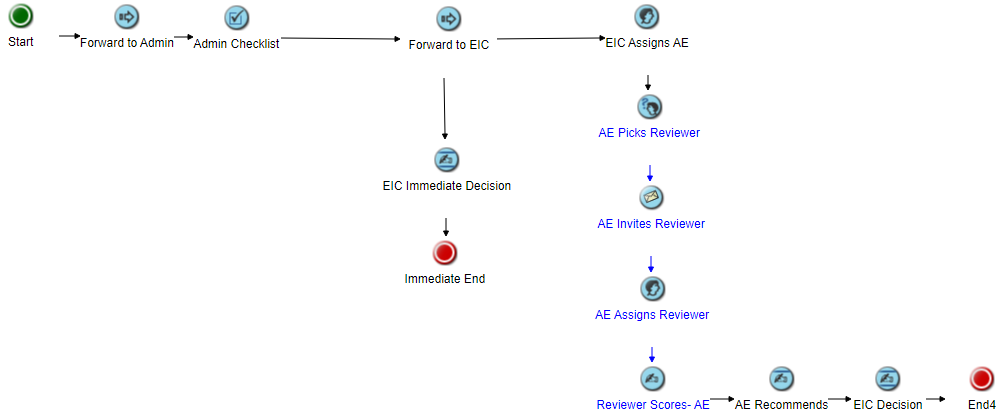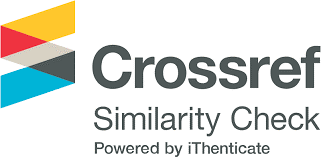Editorial Policy
The Eletrônica de Potência (Open Journal of Power Electronics), published by SOBRAEP, is an Open Access journal with single-blinded peer review process. Since january of 2024 is published continuously. It aims to disseminate the latest technologies and theoretical research in the field of power electronics and inspire interdisciplinary research across academia and industry. Thus, our mission is to serve as a leading platform for the dissemination of research and innovations in the field of power electronics. The following list of topics is not intended to be exhaustive, but rather to indicate topics that fall within the journal purview:
1. Authors Responsibilities
a. Authorship: The authorship is defined according to ICMJE. All the authors must be involved in the work and should be in place to provide the requirements for authorship and contributorship. By accepting the paper submission, all authors declare that they are according to the publication of the results in the form submitted and they can provide additional proofs of the results if the reviewers or editors require it. The editorial team judges potential disputes. Change of authorship is just accepted after the first submission, if all the authors send a formal letter for the Editor Chief. In this letter, it is mandatory to describe the contribution of each author and the reason for the demanded change.
b. Author's contributions: The journal adopts the Contributor Roles Taxonomy (CRediT) to provide detailed and standardized descriptions of each author's contributions to a research article. CRediT offers a comprehensive framework that clearly defines specific roles such as conceptualization, methodology, software, validation, formal analysis, investigation, resources, data curation, writing – original draft, writing – review & editing, visualization, supervision, project administration, and funding acquisition. By using CRediT, we aim to ensure transparency and give proper recognition to each contributor's efforts, enhancing the clarity and fairness in the attribution of scholarly work.
c. Errors in published papers: When errors are detected in a published paper, it is obligation of all authors to notify the Editor-in-Chief (editor@sobraep.org.br) and cooperate to correct the paper. If third parties report errors, the authors must investigate and cooperate for the correction.
d. Appropriate recognition of sources: The authors are obliged to inform the list of references and the financial support, in according to template of the Eletrônica de Potência (Open Journal of Power Electronics).
e. Intelligence Artificial (IA) policy: Intelligence Artificial can be used as part of the research conducted if clearly stated in the paper. The use of IA for writing the paper or part of it is denied in the Eletrônica de Potência (Open Journal of Power Electronics). IA may be used just as a tool to help the text revision, but always with the human verification.
f. Redundant publication: Authors must not submit manuscripts describing the same research in more than one journal. Publications in the form of a summary or as an academic thesis are not considered as prior publication. Previously published conference papers can be submitted, only if comprehensive additional results are provided. The conference paper must be cited.
g. Preprint: In line with the Open Science movement, the publication supports the use of preprint servers and accepts manuscripts previously deposited on trusted servers such as SciELO Preprints: https://preprints.scielo.org/index.php/scielo/user/register
The text previously published in preprint must be correctly cited, and this information needs to be informed in the submission process. Besides, we recommend that authors verify that they effectively hold the copyright of the text.
2. Peer-Review Process
It is recommend three reviewers, and in special conditions at least two reviewers, are assigned by the Associate Editor on each manuscript based on their technical expertise. The journal adopts single-blinded peer review (anonymous peer review). The decision is taken based on the reviewers recommendation which the manuscript receives during the review process.
The peer review carried by the Journal follows the Ethical Guidelines of COPE. The main points are:
• Reviewed articles are treated confidentially;
• Authors who have benefited from the peer review process should consider becoming peer reviewers of the journal;
• The reviewer must agree to review a paper only if he/she have the necessary expertise to assess the manuscript and can be unbiased in his/her assessment;
• Any potential competing, or conflicting, interests must be declared by the reviewer or editors. If the reviewers/editors are unsure about a potential competing interest that may prevent they from reviewing, it is important to decline the invitation to review;
• A conflict of interest is mainly characterized by the reviewer or editor that work or have worked recently with one of the authors of the paper. A close relationship can also represent a conflict of interest;
• If during the review process the editor identifies a conflict of interest between authors and a reviewer, he/she must exclude the revision. If a conflict of interest is identified after the publication, the Editor Chief must investigate if that review was crucial for the paper acceptance and take ethical actions;
• Articles authored by a member of the editorial team are independently peer reviewed; an editor will have no input or influence on the peer review process or publication decision for their own article;
• Reviewers must not use IA for the entirely paper revision. IA may be used just as a tool to help the review.
Peer-Review workflow:
• Author submits
• Admin checks and passes to Editor-in-Chief (EIC)
• Editor-in-Chief assigns to Associate Editor (AE)
• Associate Editor invites and/or assigns reviewer(s)
• Reviewers score
• Associate Editor recommends decision
• Editor-in-Chief makes final decision

Figure: Peer-Review Workflow. Source: ScholarOne Manuscripts.
In line with Open Science communication practices, the Journal can open the peer review process, if required by the correspondent author and in agreement with the reviewer.
3. Publication Statements
a. Plagiarism: Authors should ensure that they have written original works, and, if the authors used works of other authors, this must be properly cited.
All accepted manuscripts will be screened for Similarity Check software - Powered by iThenticate. The authors who submit manuscripts with more than 20% of duplicated or similar content, excluding the reference text, will be notified asking for text revision by the Editorial-in-Chief.
b. Research misconduct: Any allegation of misconduct of editors, reviewers or authors is seriously investigated by the journal. In case of suspect of misconduct of reviewers or authors, the Editor Chief is responsible to take actions to verify if the allegation is true and proceed the exclusion of the revision (reviewers case) or withdraw of the paper (authors case). If the editorial team is accused of misconduct, the president of Brazilian Association of Power Electronics (SOBRAEP) is responsible to investigate and take the actions according to the faults (e-mail:presidente@sobraep.org.br).
c. Retracting or correcting articles workflow:
• Associate Editor (AE) evaluates
• Associate Editor passes to EIC (Editor-in-Chief)
• EIC evaluates
• Editor-in-Chief passes to Editorial Board
• Editorial Board evaluates e recommends final decision
d. Publish corrections: Editors always must to publish corrections, clarifications, retractions and apologies when needed.
e. Manuscript withdrawal: Only used for manuscripts accepted for publication but not formally published as well as without complete volume and number information. Sometimes, documents may represent violations of professional ethics codes, such as multiple submission, plagiarism, or dishonest use of data. In these cases, the documents can be withdrawn from Eletrônica de Potência (Open Journal of Power Electronics). Withdrawn means that the content of the paper is removed and replaced with a PDF informing that the paper has been withdrawn in accordance with the policy of the Eletrônica de Potência (Open Journal of Power Electronics).
f. Ethical requirements:
Before submitting the research, the authors must ensure they have followed all ethical guidelines regarding scientific integrity. They must also disclose any funding sources, such as research agencies. If applicable, the author must declare that the ethical principles were submitted to and approved by the institution's ethics committee. The author is solely responsible for complying with good ethical practices in research.
Eletrônica de Potência (Open Journal of Power Electronics) adheres to the ethical codes of SciELO, including the "Guide of Good Practices for Strengthening Ethics in Scientific Publication", the "Principles of Transparency and Good Practices in Academic Publications" recommended by the Committee on Publication Ethics (COPE), the principles of the Directory of Open Access Journals (DOAJ), and the principles of the Open Access Scholarly Publishers Association (OASPA).
When the manuscript involves procedures with human beings, or LGPD-sensitive data, authors must attach an approval statement from the ethics committee of the institution responsible for approving the research.
4. License, Copyright and Access
a. Open access license:
Since December, 2023, all articles published by Eletrônica de Potência (Open Journal of Power Electronics) are available and protected under the Creative Commons license (CC-BY). This license requires that reusers give credit to the creator. It allows reusers to distribute, remix, adapt, and build upon the material in any medium or format, even for commercial purposes.
b. Copyright:
Authors who publish in this Journal agree to the following terms:
Authors retain copyright and grant the Journal the right of first publication, with the work simultaneously licensed under the Creative Commons Attribution (CC-BY), allowing the work to be shared with acknowledgement of authorship and initial publication in this Journal.
Authors are authorized to take on additional contracts separately, for non-exclusive distribution of the version of the work published in this Journal (e.g. publish in an institutional repository or as a book chapter), with acknowledgement of authorship and initial publication in this Journal.
If your manuscript contains content such as photos, images, clipart, tables, audio files, videos, proprietary protocols, code, etc., that you or your co-authors do not own or did not create, we will require you to provide us with proof that either:
1. the material is in the public domain or available under an open access license compatible with CC BY 4.0, or
2. the owner of that content has given you written permission to use and publish the content under an open access CC BY 4.0 license.
c. Repositories:
Eletrônica de Potência encourages authors to self-archive their accepted manuscripts, publishing them on personal blogs, institutional repositories and academic social media, as well as posting them on their personal social media, as long as the full citation is included in the version of the Journal website.
d. Availability of papers: Papers are available to readers without fees (open access) in Previous Issues.
5. Archiving - Digital Preservation Policy
The Eletrônica de Potência journal article files are preserved by storing them in LOCKSS (supported by PKP Preservation Network (PKP PN)) and in the SOBRAEP server. Furthermore, the metadata are preserved in Crossref by DOI.
6. Ownership and Management
The Brazilian Association of Power Electronics (SOBRAEP) has the ownership and management of the Eletrônica de Potência (Open Journal of Power Electronics).
7. Web Site
The Brazilian Association of Power Electronics (SOBRAEP), including the Eletrônica de Potência (Open Journal of Power Electronics), takes care to ensure high ethical and professional standards.
8. Publishing Schedule
11. Sex and Gender Issues
The Editorial Team of the Eletrônica de Potência (Open Journal of Power Electronics) Journal, in addition to the authors who publish in the journal, must always observe the guidelines on Sex and Gender Equity in Research – SAGER. The SAGER guidelines comprise a set of guidelines that guide the reporting of information about sex and gender in study design, data analysis, and results and interpretation of findings.
Journal Title: Eletrônica de Potência (Open Journal of Power Electronics)
ISSN Hardcopy: 1414-8862
ISSN Electronic: 1984-557X
Register in CAPES: Eletrônica de Potência
Classification/Indexing in CAPES (2017-2020): Qualis A4, Nacional











